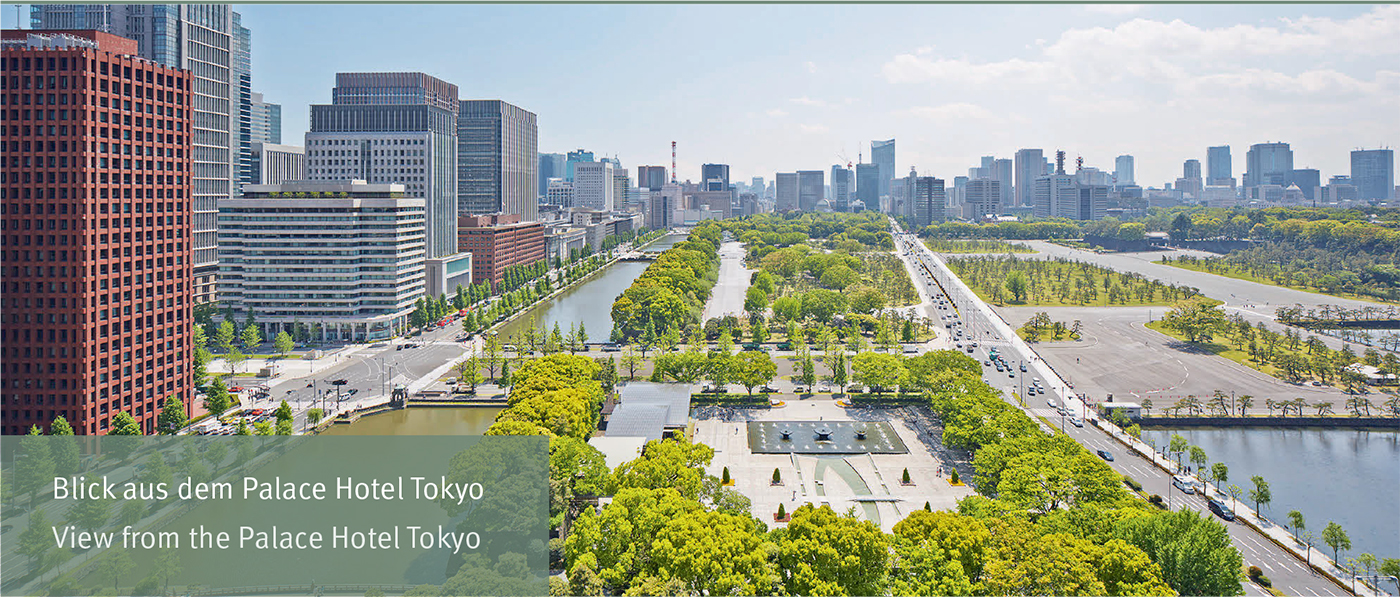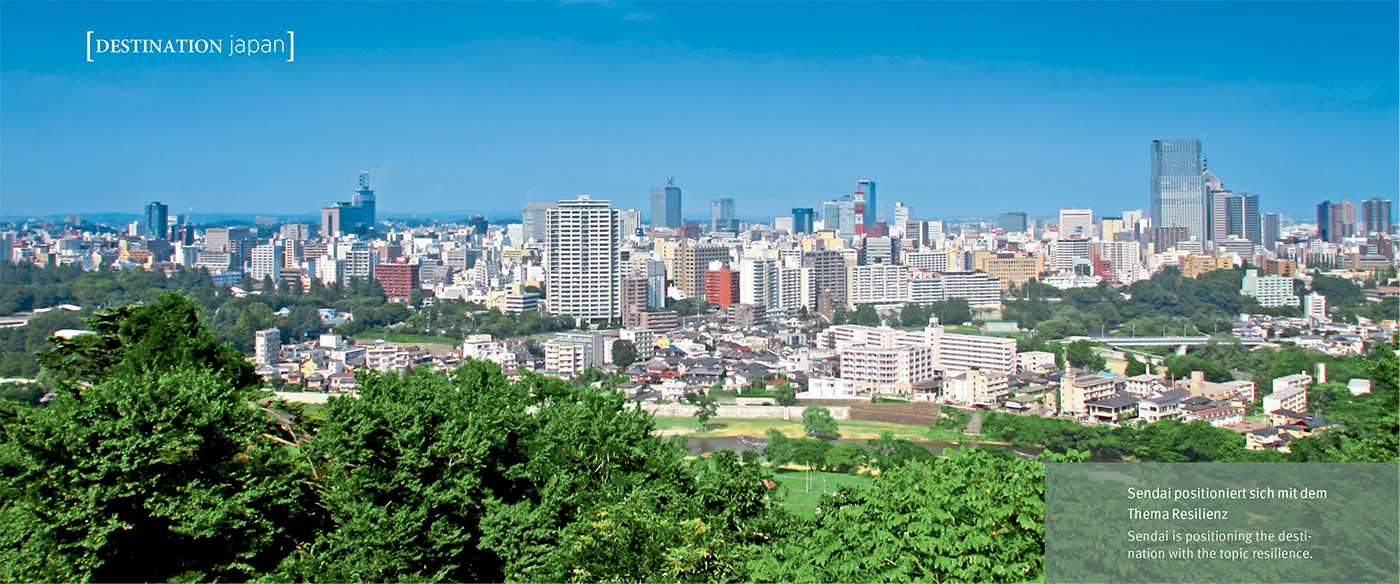News
2019.09.05 cim "BEREIT FUR MEGA-EVENTS”/"ALL SET FOR MEGA-EVENTS"
ENGLISH BELOW
BEREIT F?R MEGA-EVENTS
This article was produced by cim, Conference & Incentive Management.Auf G20-Gipfel, Olympia 2020 und World Expo 2025 ist Japan gut vorbereitet. Planer erwartet exzellente Infrastruktur, pr?zise Logistik und perfekte Gastkultur mit Exotik-Flair.
■Neue Ideen. Mit 31,19 Mio. G?sten aus ?bersee verzeichnete Japan 2018 ein Rekordergebnis. Den wirtschaftlichen Erl?s aus internationalen Business Events beziffert die Japan National Tourism Organisation (JNTO) mit umgerechnet 4,2 Mrd. Euro. Die globale MICE-Branding-Strategie mit dem Motto ?New ideas start here“ setzt auf Inspiration und Innovation des ostasiatischen Inselstaates. Er rechnet 2020 mit 40 Mio. G?sten. Mega-Events wie G20-Gipfel und Rugby-Worldcup 2019, Olympische Sommerspiele 2020 in Tokio und World Expo 2025 in Osaka setzen schon jetzt Signale.
?Japan liegt auf Rang sieben der ICCAL?nderstatistik. In den n?chsten zehn Jahren er?ffnen landesweit zehn neue MICE Einrichtungen“, berichtet Etsuko Kawasaki. Der Direktor des Japan Convention Bureaus begr??t Ende Februar 2019 erstmals auch Hosted Buyer aus ?bersee auf der 28. International MICE Expo Japan (IME) im International Forum Tokio. Insgesamt 500 Eink?ufer informieren sich an 97 St?nden ?ber Japans Branchenangebot.
Mit Spannung erwartet wird die im September 2019 er?ffnende Aichi Sky Expo mit 60.000 qm Nutzfl?che plus Convention Centre. Die direkt an den Flughafen Chubu, zwischen Tokio und Kyoto, angebundene Expo wird von GL Events betrieben. Mit 44.000 qm Eventfl?che wartet nach der Erweiterung ab April 2020 das Pacifico in Tokios Nachbarstadt Yokohama auf. In Nara, Standort dreier Unesco-Welterbest?tten, ?ffnet 2022 ein Kongresszentrum. Impulsgeber f?r Kongresse ist die Kansai Science City im Norden Naras.
Dass Japans Kultur f?r mehr Delegierte sorgt, zeigt das Beispiel des World Congress of Neurology 2017 in Kyoto. ?Statt der erwarteten 5.000 Teilnehmer kamen 8.600. Das beweist Japans Appeal“, erkl?rt Hidehiro Mizusawa, Pr?sident des National Centers of Neurology and Psychiatry.
In Tokio schl?gt das Herz von Japans Kongresswirtschaft. ?30 Prozent der 61 Kongress-Botschafter Tokios leben in Tokio“, sagt Mamoru Kobori. Als zentrale Vision f?r die Olympiade 2020 nennt der JNTO-Vizepr?sident Nachhaltigkeit, Tradition und? Innovation sowie Sicherheit, etwa mit Gesichtserkennung beim Einlass in das 80.000-Pl?tze-Stadion. Sitz des IOC ist das Imperial Hotel, das wie das Palace Hotel Tokyo, mit gro?en Meetingr?umen zu den ?Leading Hotel of the World“ geh?rt.
Der zentrale Distrikt Marunouchi, wo die Regierung, Banken und Konzerne ihren Sitz haben und 25 Prozent von Japans BIP erwirtschaftet werden, hat sein MICE-Angebot geb?ndelt. Das im Januar 2019 wiederer?ff-nete Tokyo Kaikan, wo 1975 schon die Queen zu Gast war, punktet mit dem ikonischen Ballsaal ?The Rose“ f?r 2.000 Cocktail-G?ste und weiteren S?len. Mit authentischen Kulturerlebnissen aus der Edo-Zeit begeistert der Kanda Myojin Schrein. Das Konzept der als Edo Cultural Complex (EDOCCO) firmierenden Anlage ist es, Tradition und Innovation zu verbinden. Kabuki-Tanz und Tempel-Zeremonien sind ebenso buchbar wie Hallen mit modernster Technik. Der Urban 20 Mayors Summit kommt im Mai 2019 mit einer Veranstaltung.
Japans innovative Technik inszeniert die Nippon Gallery. Auf 2,7 mal 10 m gro?en LED-W?nden werden die mit 3-D-Kameras aufgenommenen Wunder aus Japans Natur zum hautnahen Virtual-Reality-Erlebnis. Die zweite Artificial Intelligence Exhibition & Conference (AI Expo) fand vom 3. bis 5. April 2019 mit 250 Ausstellern und rund 50.000 Besuchern im Messezentrum Tokyo Big Sight statt. Der ikonische Bau mit ?ber 230.000 qm Fl?che beherbergt in seinen Konferenzt?rmen mehrere S?le f?r 1.000 G?ste. Am Herzen liegt Tokios B?rgermeister das im Mai 2019 direkt nach dem Urban Mayors Summit stattfindende Urban Resilience Forum (URF) zum Thema ?Effective Disaster Risk Management. Common Responsibilities and unique Initiatives“.
Resilienz ist f?r Sendai ein zentrales Thema. In eineinhalb Stunden mit dem Hochgeschwindigkeitszug Shinkansen ab Tokio erreichbar, war die Stadt an Japans Nordostk?ste von den Auswirkungen des Tsunamis im M?rz 2011 betroffen. ?Sendais Motto lautet Resilienz, Harmonie and Inspiration“, betont Asuka Tashiro vom Sendai Convention Bureau. Seit dem Beben der St?rke 9 auf der Richterskala, veranstaltet die, wie ein Ph?nix wiederauferstandene, Stadt Studientouren zur? Katatrophenvorbeugung.
Im September 2020 kommt der 17. World Congress on Earthquake Engineering ins Sendai International Center. F?r internationale Kongresse mit mindestens 1.500 G?sten gibt es finanzielle Unterst?tzung von bis zu 80.000 Euro. Das an Sendais Tohoku Universit?t gegr?ndete Tohoku-Forum f?r Kreativit?t mobilisiert jedes Jahr eine interdisziplin?re Denkfabrik mit Forschern aus aller Welt. Elegante Hotels wie das Westin mit Meetingr?umen, die bis zu den schneebedeckten Bergen blicken lassen, oder das Metropol am Bahnhof sind ebenso gut gebucht, wie das Royal Park Hotel mit Incentive-Optionen. Daf?r empfiehlt sich auch eine Schiffstour durch die nahe Matsushima-Bucht mit 260 Inseln.
Tsukuba, eine Stunde nord?stlich Tokios, ist im Juni 2019 einer der Gastgeber des G20-Gipfels. In Japans gr??ter Wissenschaftsstadt, 1987 zum Entlasten Tokios gegr?ndet, empf?ngt das Tsukuba International Congress Centre das Meeting der Minister f?r Handel und digitale Wirtschaft. Bereits 2016 war Tsukuba w?hrend des G7-Gipfels Schauplatz des Treffens der Wissenschaftsminister. Sie besuchten das National Institute of Advanced Industrial Science and Technology (AIST) und das Tsukuba Space Center.
Der Genuss authentisch japanischer Kultur und K?che steht im Sansuitei Man -sion auf dem Programm. Die, dem Anwesen eines Samurais nachempfundene Anlage, umgeben von einem gro?en Zen-Garten, beherbergt R?ume in japanischem Dekor.
?Die meisten nationalen Wissenschaftsinstitute haben hier ihren Sitz. Als weltgr??ter Forschungskomplex mit Forschern aus 78 L?ndern sind wir auf dem globalen Kongressmarkt gut aufgestellt“, sagt Hiroshi Hoshino, Generalsekret?r der Tsukuba Tousism & Convention Association.
Katharina Brauer
All set for mega-events
The G20 Summit, 2020 Olympics and 2025 World Expo are coming.
Japan is ready ? with excellent infrastructure, high-precision logistics and impeccable hospitality.
■New ideas. Japan welcomed a record 31.19m visitors from abroad in 2018. The Japan National Tourism Organisation (JNTO) estimates revenues from international business events at around 4.2 bn euros. The global MICE branding strategy (tagline: “New ideas start here”) places the focus on Japanese inspiration and innovation. 40 m visitors are expected in 2020. Huge events such as the G20 summit and Rugby World Cup in 2019, the 2020 Olympic Games in Tokyo and the 2025 World Expo in Osaka are already having an impact.
“Japan is seventh in the ICCA’s country rankings. Ten new MICE venues will be opening around the country in the next ten years,” reports Etsuko Kawasaki, Executive Director of the Japan Convention Bureau. In late February he welcomed international hosted buyers for the first time at the 28th International MICE Expo Japan (IME) at the Tokyo International Forum. A total of 500 buyers learned what Japan has to offer at 97 stands.
The opening of Aichi Sky Expo in September 2019, offering 60,000 sqm of space and a convention centre, is keenly anticipated. Located at Chubu Airport, between Tokyo and Kyoto, the venue will be run by GL Events. The Pacifico in Yokokama, a city just outside Tokyo, will have 44,000 sqm of event space from April 2020 following an extension. A convention centre is opening in Nara, where there are three Unesco world heritage sites, in 2022. Kansai Science City in northern Nara is a significant source of conventions.
The World Congress of Neurology 2017 in Kyoto is one example of how Japan’s culture lends itself to meetings. “8,600 delegates came, although only 5,000 had been expected. That highlights Japan’s appeal,” explains Hidehiro Mizusawa, President of the National Center of Neurology and Psychiatry.
Tokyo is the centre of Japan’sconvention industry. “30 per cent of our 61 convention ambassadors live in Tokyo,” says Mamoru Kobori of the JNTO. The central vision for the 2020 Olympics is sustainability, tradition, innovation and security. Facial recognition technology will be used at the gates of the 80,000-seat stadium. The IOC will be based at the Imperial Hotel, which, like the Palace Hotel Tokyo, is a Leading Hotel of the World and offers large meeting rooms.

The central district of Marunouchi, where the government, banks and large companies are based and 25 percent of Japan’s GDP is generated, has pooled its MICE offerings. Tokyo Taikan, where the Queen stayed in 1975, reopened in January 2019. It offers a number of large function rooms including an iconic ballroom, The Rose, which can hold 2,000 for cocktails. The Kanda Myojin shrine delights visitors with an authentic experience of the culture of the Edo period. The idea behind the Edo Cultural Complex (EDOCCO), its official name, is to combine tradition and innovation. Kabuki dancing and temple ceremonies can be booked, as can halls with cutting-edge technology. The Urban 20 Mayors Summit is coming in May 2019.
The Nippon Gallery showcases Japan’s innovative technology. The wonders of the natural world in Japan are displayed on LED walls measuring 2.7 by 10 metres, providing a rich virtual reality experience. The second Artificial Intelligence Exhibition & Conference (AI Expo) took place at the Tokyo Big Sight exhibition centre from 3 to 5 April 2019, attracting 250 exhibitors and around 50,000 visitors. This iconic building offers 230,000 sqm of space as well as rooms for 1,000 delegates in its conference towers. The Urban Resilience Forum (URF) right after the Urban 20 Mayors Summit is close to the heart of Tokyo’s mayor. It will focus on shared responsibilities and unique initiatives in relation to effective disaster risk management.
Resilience is a central issue for Sendai. A 90-minute high-speed train ride from Tokyo, this city on Japan’s north-east coast suffered the consequences of the tsunami in March 2011. “Sendai’s motto is ‘Resilience, Harmony and Inspiration’,” emphasises Asuka Tashiro of the Sendai Convention Bureau. Since the earthquake, which was a 9 on the Richter scale, the city has risen like a phoenix and now organises disaster-prevention study tours.
The 17th World Congress on Earthquake Engineering is coming to the Sendai International Center in September 2020. Funds of up to 80,000 euros are available for international conventions with at least 1,500 delegates. The Tohuku Forum for Creativity established at Sendai’s Tohoku University invites international researchers to take part in an annual multi-disciplinary event. Elegant hotels such as the Westin, which has meeting rooms with views of snow-covered mountains, or the Metropol by the station, receive plenty of bookings, as does the Royal Park Hotel, which offers incentive options. A boat tour of nearby Matsushima Bay, which has 260 islands, is highly recommended.
Tsukuba, an hour north-east of Tokyo, is a host city of the G20 summit in June 2019. In Japan’s biggest science city, established in 1987 to reduce the burden on Tokyo, ministers for trade and the digital economy will be meeting at the Tsukuba International Congress Centre. Tsukuba also hosted the meeting of science ministers at the G7 summit in 2016. The ministers visited the National Institute of Advanced Industrial Science and Technology (AIST) and the Tsukuba Space Center.
Sansuitei offers authentic Japanese culture and cuisine. Designed to resemble a Samurai residence and surrounded by a large Zen garden, its rooms are decorated in traditional Japanese style. “Most of Japan’s national scientific institutes have their headquarters in Tsukuba. As the world’s largest research complex, with researchers from 78 countries, we are well positioned in the global convention market,” says Hiroshi Hoshino, Secretary General of the Tsukuba Tourism & Convention? Association.
Katharina Brauer


